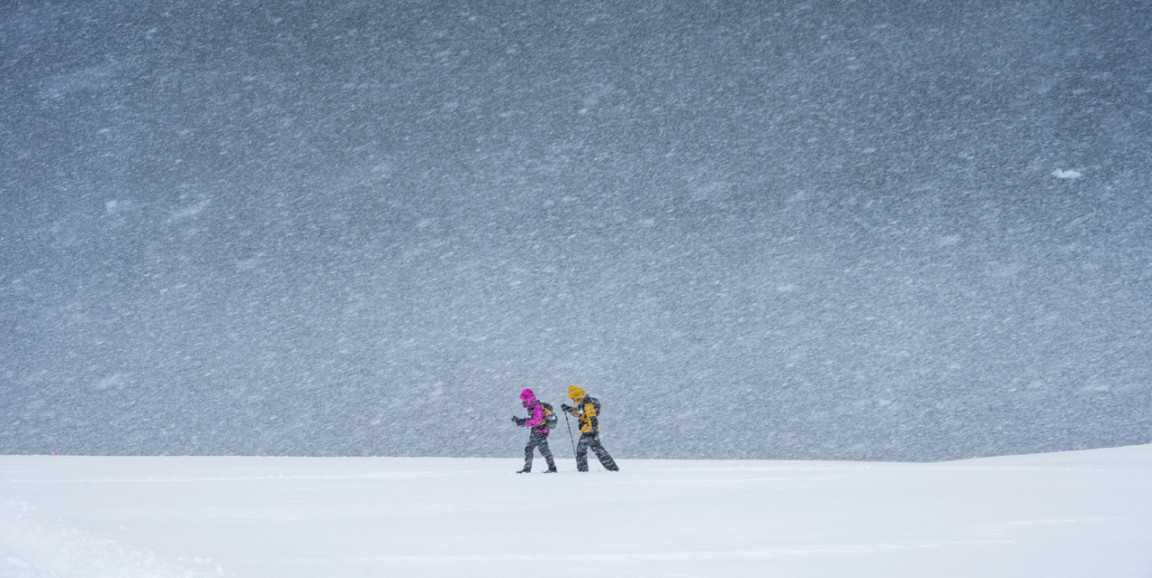If you are running an ultramarathon in the Antarctic, be sure to cede right of way to the penguins.
That was the law of the land in November when Rebecca Walker, MD, Stanford emergency medicine physician not only ran an icy ultramarathon -- she also served as guide for Brazilian runner Vlad Dos Santos, who is blind.
The 250-kilometer (155-mile) race unfolded over four days with about 60 participants and untold number of spectator penguins. Walker said the setting was close to where Ernest Shackleton's ship was crushed by ice in 1915, a harrowing story recounted in the book she read each evening.
Because of the dangerous conditions, all participants were required to complete at least two prior ultramarathons. Walker had three under her belt as a runner, in China, Chile, and Patagonia. She had also worked on the medical team for ultramarathons in China, Australia, Egypt, Chile, Madagascar, Iceland and Namibia.
Walker began distance running while living abroad and said she has little interest in traditional road marathons. "What I like about trail running is the focus on your steps through difficult terrain."
She admits she is not very scientific about training. "I train when I can. Sometimes biking or swimming. I squeeze in runs in different locations when I'm traveling. Most of my work travel falls in busy capital cities, so air pollution is a problem."
When not racing or working in Stanford's Marc and Laura Andreessen Emergency Department, Walker travels frequently to low- and middle- income countries to develop emergency care systems as part of Stanford Emergency Medicine International. She was instrumental in establishing the Nepal Ambulance Service and a physician training program in Myanmar, among other efforts.
Walker said her motivation as a physician is the same as her reason for guiding Dos Santos, also an experienced ultramarathoner. "I love helping someone do something important to them, helping them maintain their dignity throughout. I like the challenge of problem-solving to give someone their best chance, whether it is recovering or running."
The experience also "gives perspective," she said. "Not everything revolves around what we are doing inside hospital walls. There's a whole wide world out there."
Walker was tethered to Dos Santos by a piece of string to help him gauge distances. Walker also gave verbal warnings of holes, ice and upcoming turns; she spoke Spanish and he spoke Portuguese, but somehow the system worked.
Day one of the race brought blizzard-like conditions that limited the run to eight hours. Walker was concerned the challenging start would dampen their enthusiasm, but it also happened to be Dos Santos' birthday. At the end of the day, he couldn't have been more pleased at having run the equivalent of a marathon in Antarctica on his birthday, she said: "That set the tone for the rest of the race."
Instead of traveling from point A to B as in most races, participants ran a different looped course each day, bunking in a ship at night. This meant they did not have to carry food (nor was it allowed, to protect pristine Antarctica). They did carry backpacks with safety equipment and clothing in case of injury.
Dangers included hidden ponds, icefalls and injury from slipping and falling, in addition to the "normal" ultramarathon dangers of dehydration, electrolyte imbalance, and sprained ankles. Walker was not overly concerned; having worked on the medical crews prior she knew the safety team always erred on the side of caution. "But," she added, "Anything can happen in that environment, even to really fit runners."
On an average day, participants ran through snow for eight to 11 hours. "The first four to five hours weren't bad, but then it becomes really hard to get warm again," Walker explained. "The course was often a couple feet deep in snow, so on the first loop, we would sink up to our knees. Then you wear down a track and could actually run. The penguins liked the trail too."
One day, to distract from the cold, Dos Santos talked about losing his sight in his 30s and having his sense of identity redefined. Walker said she could relate; she has witnessed newly-diagnosed patients struggle to reshape their identity because of ailment or disease. "There can be a loss of self and the need to redefine, in a very strong way," she said.
The intense cold would have been very concerning, if they weren't going back to warm boat each night, Walker said. Instead they could bring themselves to the point of almost being dangerous, "But in a safe, responsible way."
Walker and Dos Santos safely crossed the finish line, but that is almost beside the point. They ran for the adventure, she emphasized. If they hadn't finished, Walker said she would have considered it just another kind of life experience. Pragmatism she had developed, perhaps, due to her professional role addressing whatever comes through the emergency department doors.
I asked Walker if she ever considered, say, climbing Mt. Everest. Her answer was telling. "It would be too hard to climb Everest as a physician, and not stop to help people along the way. Lots of people up there aren't feeling too well." Instead, she is considering an ultramarathon in Namibia.
Dos Santos has already promised to volunteer and cheer her on.
Photo by Thia Godiz




